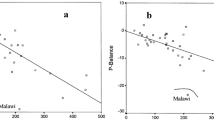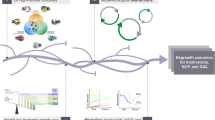Abstract
The industrial nations are often accused of achieving their relative affluence by using natural resources at the expense of the developing countries. Is this accusation justified? Would it really be in the developing countries' interests if the industrial nations drastically reduced their consumption of natural resources, as is so often demanded?
Similar content being viewed by others
References
Cf. BUND, MISEREOR (eds.): Zukunftsfähiges Deutschaland, abridged version, p. 25.
Cf. F. Hinterberger, F. Luks, M. Stewen: Ökologische Wirtschaftspolitik. Zwischen Öko-Diktatur und Umweltkatastrophe, Basle 1996, p. 121.
Cf. UNDP: Human Development Report 1997, pp. 225 and 251 (in German version); own calculations.
Cf. BUND, MISEREOR (eds.), op. cit., Zukunftsfähiges Deutschland., abridged version, pp. 8–10. This study assumed, for example, that to reduce the use of the atmosphere as a sink for carbon dioxide emissions it would be necessary to cut worldwide emissions to 50–60%. With a world population of 5.8 billion people, that would only permit annual CO2 emissions of 2.3 tonnes per head. But because current, emissions in Germany are 12 tonnes per head, the country would need to reduce them by 80%, and that requirement would increase to 90% if he world population reached its projected 10 billion people by the year 2050.
Cf. BUND, MISEREOR (eds.), op. cit., Zukunftsfähiges Deutschland., abridged version, p. 7.
Cf. H. Mohr: Qualitatives Wachstum. Losung für die Zukunft, Stuttgart 1995, pp. 56–57.
J. Rawls: A Theory of Justice, Cambridge, Mass. 1971; see also the commentary by P. Ulrich: Integrative Wirtschaftsethik. Grundlagen einer lebensdienlichen Ökonomie, Berne 1997, pp. 247–259.
Cf. DIE ZEIT, 5th November 1998, p. 37.
Cf. UNDP: Human Development Report 1997, p. 244 (in German version); own calculations.
Cf. World Bank: World Development Report 1992, Washington, D.C. 1992, p. 217.
Author information
Authors and Affiliations
Additional information
This article is based on a short lecture by the author and subsequent discussion period at a forum on ‘Germany as a developing country: Our environmental burdens are carried by the poor’ held at the University of Würzburg on 3rd December 1998, as part of a commemorative discussion series entitled ‘Poverty and Globalisation. 40 Years of Misereor—A Symbol of Hope’. The author would like to thank all the participants at this event for the many suggestions and points they made. He is also most grateful to his colleagues Christian Leon and Wolfgang Weimer-Jehle for their critical discussion of the manuscript. The article reflects the author's personal opinions.
Rights and permissions
About this article
Cite this article
Pfister, G. Are we living at the expense of the developing countries?. Intereconomics 34, 187–191 (1999). https://doi.org/10.1007/BF02927847
Issue Date:
DOI: https://doi.org/10.1007/BF02927847




